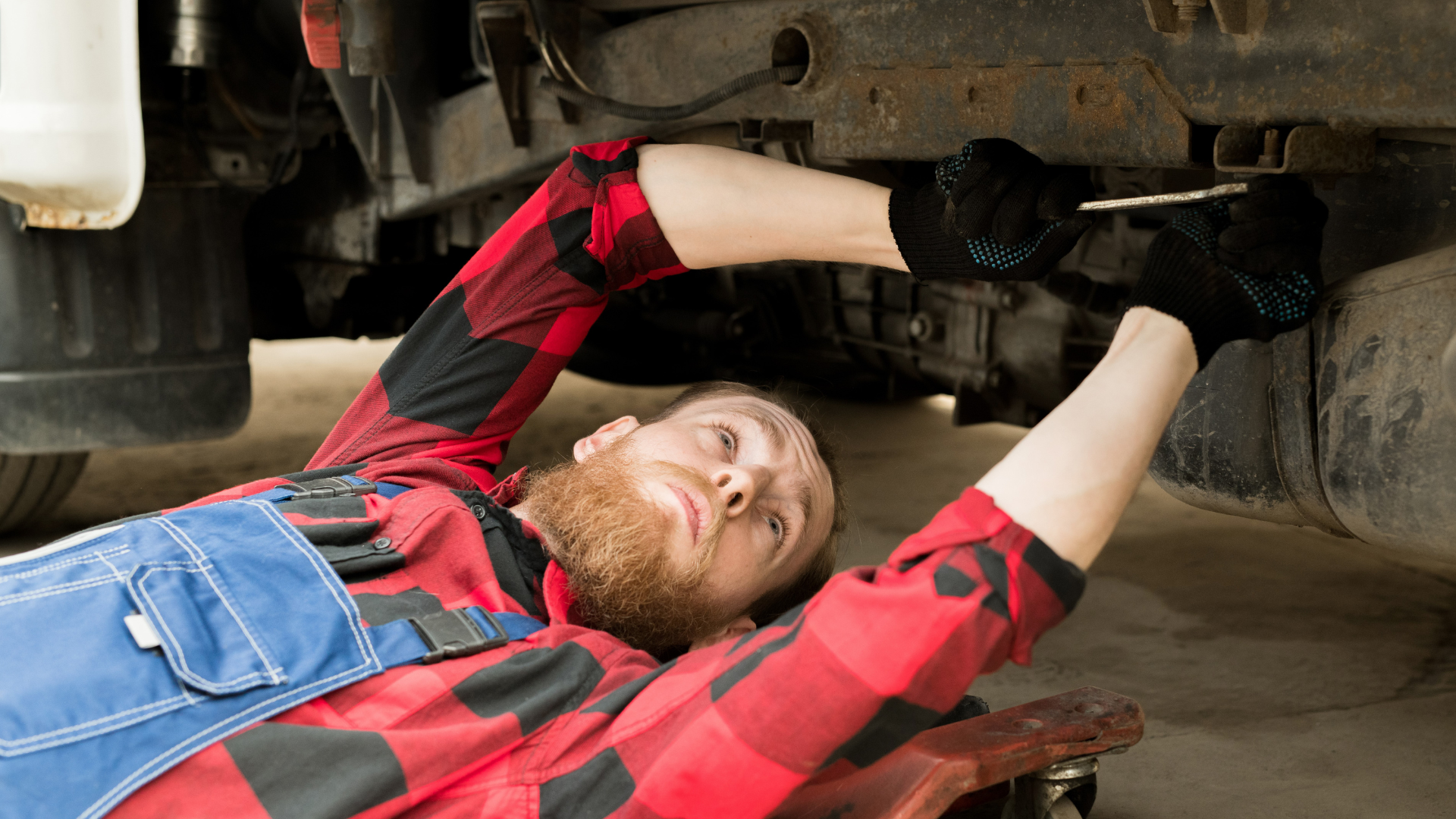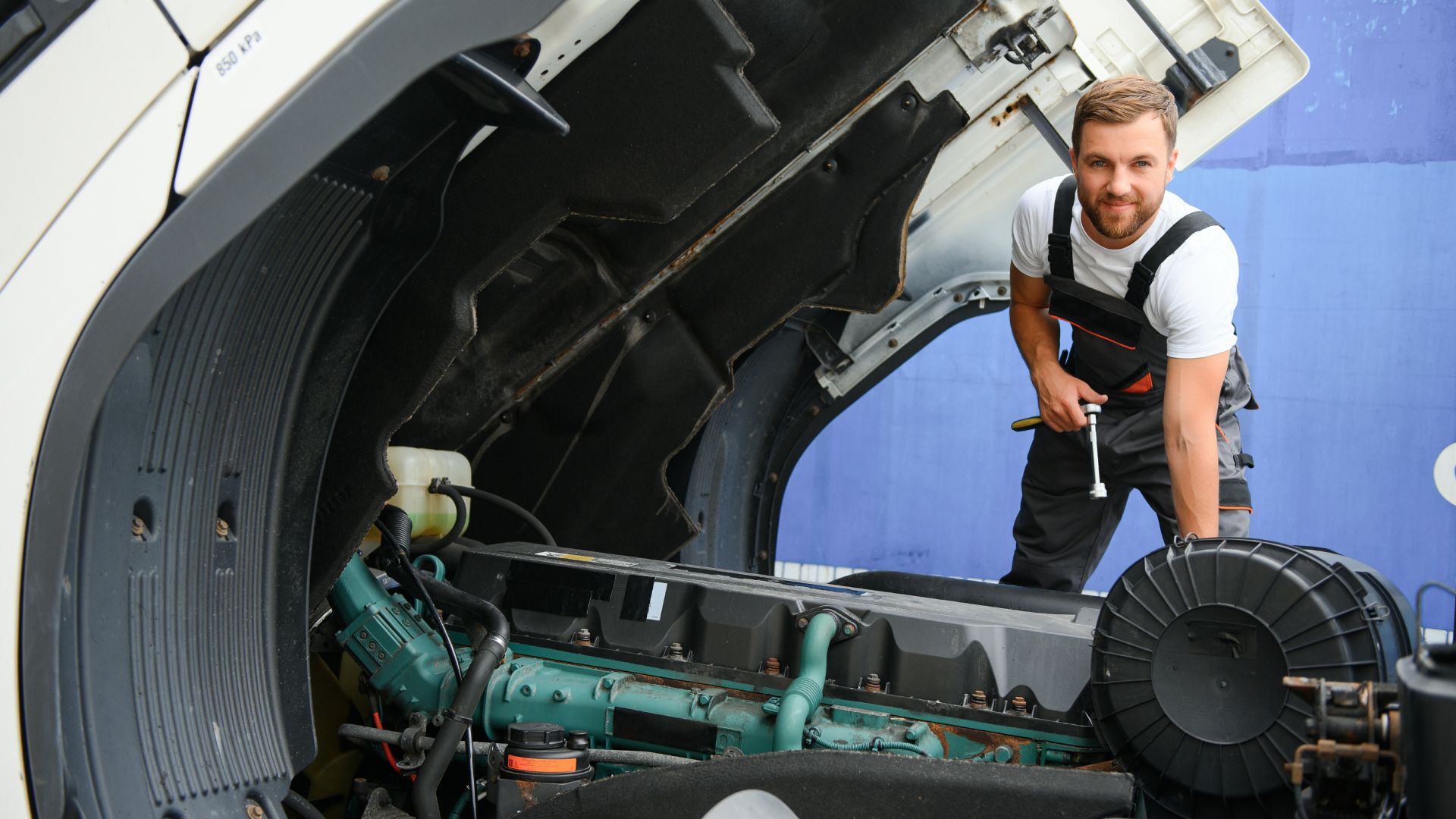
Oh no, your rig has broken down in the middle of nowhere! Don’t panic – we’ve got you covered. In this blog post, we’ll walk you through what to do when your truck breaks down and how to get back on the road as quickly as possible. Stay tuned for expert tips and advice on truck repair that will have you back behind the wheel in no time.
Need a hand while on the road? We’re here to help you! Call us here.
Importance of Proper Truck Maintenance and Repair
Trucks are the backbone of many industries and play a crucial role in transporting goods from one place to another. As such, they are subjected to heavy usage and long hours on the road, which can take a toll on their performance. It is not uncommon for trucks to break down unexpectedly, causing major delays and financial losses for businesses.
To avoid these situations, it is essential to prioritize proper truck maintenance and repair. Neglecting or postponing necessary maintenance tasks can lead to more significant problems down the road, resulting in costly repairs and even safety hazards.
We recommend you to see this article: Emergency Trailer Repair: What to Do When Your Trailer Breaks Down on the Highway
Common Causes of Truck Breakdowns
In this section, we will discuss some of the most common causes of truck breakdowns and how you can prevent them.
1. Engine problems: The engine is one of the most critical components of a truck, and any issues with it can result in a breakdown. Some common engine problems that can lead to a breakdown include overheating, low oil pressure, faulty sensors, or worn-out components such as belts or hoses. Regular maintenance and timely repairs can help prevent engine-related breakdowns.
2. Electrical issues: Trucks today are equipped with complex electrical systems that control various functions such as lights, brakes, and engines. Any malfunction in these systems due to wiring issues or blown fuses can cause your rig to break down unexpectedly. Regular checks on your electrical system during maintenance intervals can help identify potential problems before they escalate into breakdowns.
3. Tire blowouts: A tire blowout is when a tire suddenly loses air pressure while driving, causing it to burst or deflate rapidly. This type of breakdown is not only dangerous but also costly as it often leads to damage on other parts of the truck such as fenders or suspension components. Overloading, under-inflated tires, or worn-out treads are some common reasons for tire blowouts.
4. Fuel system failures: The fuel system is responsible for supplying clean fuel to the engine for combustion, making it an essential component in keeping your rig running smoothly. Clogged filters or contaminated fuel are frequent culprits behind fuel system failures leading to unexpected breakdowns.
5. Transmission issues: Your truck’s transmission is responsible for shifting gears smoothly while driving and plays a crucial role in its overall performance. Problems with transmissions such as leaks, worn-out gears, or clutch failure can result in breakdowns and expensive repairs.
To know more about truck and trailer repair, contact us.
Signs to Look Out for Before Your Truck Breaks Down
By paying attention to these warning signs, you may be able to prevent a major breakdown and save yourself from a stressful and potentially dangerous situation.
1. Strange Noises: Unusual sounds coming from your truck could be an indication that something is not right. This could include squeaking, grinding, or rattling noises. These sounds could be coming from various parts of your truck such as the engine, suspension, or brakes.
2. Warning Lights: Modern trucks are equipped with warning lights that alert drivers when there is an issue with their vehicle. These lights should never be ignored as they are designed to help prevent breakdowns and keep you safe on the road.
3. Strange Smells: Unusual smells can also indicate potential problems with your truck. For example, if you smell something burning while driving, it could mean there is an issue with your engine or brakes overheating. A strong gasoline smell could indicate a fuel leak while a sweet smell may indicate an antifreeze leak.
4. Fluid Leaks: If you notice any fluid leaks underneath your truck after parking it overnight, this could be a sign of an impending breakdown. Whether it’s oil leaking from the engine or brake fluid leaking from the wheels, these leaks should not be ignored as they can lead to serious engine or brake failure.
5. Changes in Performance: As a truck driver, you know your vehicle’s performance like the back of your hand. So if you start to notice changes in how it handles, accelerates, or brakes, this could be a red flag that something is not right.
We recommend you to see this article: Semi-Truck Troubles? Here’s Why You Need 24/7 Mobile Repair Services
What to Do Immediately After Your Truck Breaks Down?
In order to minimize the impact of a truck breakdown, it’s important to know what steps to take immediately after it happens.
1. Find a safe spot: The first and most crucial step is to find a safe place to pull over your truck. If possible, try to get off the main road and onto the shoulder or an emergency lane. This will not only prevent any potential hazards for other vehicles but also give you space and time to assess the situation.
2. Turn on hazard lights: Once you have found a safe spot, turn on your hazard lights immediately. This will alert other drivers that there is an issue with your vehicle and they should proceed with caution.
3. Check for any visible damages: Before getting out of your truck, do a quick visual check for any visible damages or leaks that may have caused the breakdown. This could include flat tires, broken hoses, or leaking fluids.
4. Call for help: Depending on the severity of the breakdown, you may need assistance from roadside assistance or a towing service. If you are unable to fix the issue yourself, call for help as soon as possible.
5. Communicate with dispatch: It’s important to inform your dispatch about the breakdown so they can make arrangements for alternate deliveries if needed.
6. Stay calm: It’s understandable that breaking down in the middle of a trip can be frustrating and stressful, but it’s important to stay calm and composed in order to handle the situation efficiently.
When your truck’s in distress on the highway, don’t panic – call Fast Service for immediate, expert assistance!
Preventative Maintenance: How to Avoid Future Breakdowns?
Preventative maintenance is crucial for any truck owner, as it helps avoid unexpected breakdowns and costly repairs. As the saying goes, «prevention is better than cure,» and this certainly applies to maintaining your rig.
1. Follow the manufacturer’s recommended maintenance schedule: The first step in preventative maintenance is following the recommended service intervals provided by the truck’s manufacturer. This includes regular oil changes, tire rotations, and other essential checks specified in the owner’s manual.
2. Conduct regular inspections: Along with following the manufacturer’s recommendations, conducting routine inspections of your truck is crucial for preventing breakdowns. This involves checking fluid levels such as oil, coolant, and transmission fluid; inspecting belts and hoses for wear or damage; examining tires for proper inflation and tread depth; and looking for any signs of leaks or corrosion.
3. Keep up with fluid changes: Fluids play a significant role in keeping your truck running smoothly. Over time, fluids can become contaminated or lose their effectiveness, which can lead to engine failure or other mechanical issues. Regularly changing fluids such as engine oil, coolant, transmission fluid, brake fluid, etc., can help avoid such problems.
4. Replace worn-out parts: Just like with any vehicle, parts on a truck will wear out over time due to constant use and exposure to various road conditions. It is essential to regularly inspect and replace worn-out parts such as brakes pads/rotors, spark plugs/wires/coils (for gas engines), filters (air/fuel/oil), etc., before they cause more significant issues.
In summary, following the manufacturer’s recommendations for maintenance, conducting regular inspections, keeping up with fluid changes and replacing worn-out parts, monitoring the electrical system, addressing warning signs promptly
To get more information about us, follow us on Facebook and Instagram. Or call us right now for a road service on: repairtrucktrailer.com


